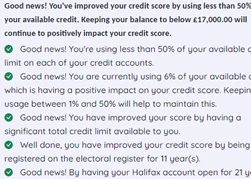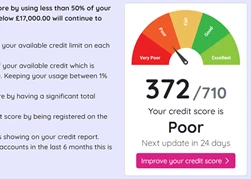Understanding Soft vs. Hard Credit Checks: What’s the Difference?

30th Apr 2025
When applying for credit in the UK, lenders may perform either a soft credit check or a hard credit check—but what’s the difference, and how do they impact your credit score? This guide explains both types of checks, when they’re used, and how they affect your financial profile.
What Is a Soft Credit Check?
A soft credit check (also called a "soft search") is a preliminary review of your credit file that:
-
Does not affect your credit score
-
Can be done without your explicit permission (e.g., for pre-approval offers)
-
Only visible to you on your credit report, not lenders
Common Uses of Soft Checks:
✔ Eligibility checks (e.g., loan or credit card pre-approval)
✔ Background checks by employers or landlords
✔ Personal credit score monitoring (e.g., CreditCheckOnline)
What Is a Hard Credit Check?
A hard credit check (or "hard search") is a full credit assessment that:
-
Requires your consent before being conducted
-
Appears on your credit report and can be seen by other lenders
-
May slightly lower your credit score (especially if multiple are done in a short time)
Common Uses of Hard Checks:
✔ Mortgage applications
✔ Credit card applications
✔ Car finance agreements
✔ Loan applications
How Do They Affect Your Credit Score?
Soft checks have no impact on your credit score, making them useful for comparing financial products without commitment. Hard checks, however, can cause a small, temporary dip in your score—typically by a few points. While one hard check is unlikely to be problematic, multiple hard searches in a short period (e.g., several loan applications in a month) can signal financial distress to lenders and may reduce your approval chances.
When Are Hard Checks Necessary?
Hard checks are required when you formally apply for credit, as lenders need a full view of your financial history to assess risk. Some industries, like mortgages and car finance, will always perform a hard check before final approval. However, many lenders now use soft search pre-approval first, allowing you to see potential offers without affecting your credit score.
How to Minimise Unnecessary Hard Checks
To protect your credit score:
-
Use eligibility checkers (soft search tools) before applying
-
Space out credit applications (ideally 3-6 months apart)
-
Avoid multiple applications in a short timeframe
Check Your Credit Report with Confidence
At CreditCheckOnline, we provide free soft-check credit reports, helping you monitor your financial health without impacting your score. Whether you’re preparing for a mortgage or just keeping track of your credit status, our service gives you full visibility—with no hidden fees.
What Is a Soft Credit Check?
A soft credit check (also called a "soft search") is a preliminary review of your credit file that:
-
Does not affect your credit score
-
Can be done without your explicit permission (e.g., for pre-approval offers)
-
Only visible to you on your credit report, not lenders
Common Uses of Soft Checks:
✔ Eligibility checks (e.g., loan or credit card pre-approval)
✔ Background checks by employers or landlords
✔ Personal credit score monitoring (e.g., CreditCheckOnline)
What Is a Hard Credit Check?
A hard credit check (or "hard search") is a full credit assessment that:
-
Requires your consent before being conducted
-
Appears on your credit report and can be seen by other lenders
-
May slightly lower your credit score (especially if multiple are done in a short time)
Common Uses of Hard Checks:
✔ Mortgage applications
✔ Credit card applications
✔ Car finance agreements
✔ Loan applications
How Do They Affect Your Credit Score?
Soft checks have no impact on your credit score, making them useful for comparing financial products without commitment. Hard checks, however, can cause a small, temporary dip in your score—typically by a few points. While one hard check is unlikely to be problematic, multiple hard searches in a short period (e.g., several loan applications in a month) can signal financial distress to lenders and may reduce your approval chances.
When Are Hard Checks Necessary?
Hard checks are required when you formally apply for credit, as lenders need a full view of your financial history to assess risk. Some industries, like mortgages and car finance, will always perform a hard check before final approval. However, many lenders now use soft search pre-approval first, allowing you to see potential offers without affecting your credit score.
How to Minimise Unnecessary Hard Checks
To protect your credit score:
-
Use eligibility checkers (soft search tools) before applying
-
Space out credit applications (ideally 3-6 months apart)
-
Avoid multiple applications in a short timeframe
Check Your Credit Report with Confidence
At CreditCheckOnline, we provide free soft-check credit reports, helping you monitor your financial health without impacting your score. Whether you’re preparing for a mortgage or just keeping track of your credit status, our service gives you full visibility—with no hidden fees.
Don't risk missing
something important
Access a comprehensive credit report
that includes detailed data from TransUnion
View your credit score for only £1.95.
You can view it for 1 month, after which it will be £14.95 per month unless cancelled.
See How You Score

See How You Score
An Independent View Of Your Credit Score
Lenders typically use their own systems to calculate your Credit Score based on the information in your Credit Report, often checking with one or more Credit Reference Agencies. Your Credit Check Online Credit Score is derived from all the Credit Report information we gather from TransUnion, helping you understand how you might be assessed when applying for credit.

Understand What is Affecting Your Credit Score
Quickly see how the details in your Credit Report influence your Credit Check Online Credit Score, both positively and negatively. This clear overview helps you identify areas for improvement and better understand the factors that lenders consider when assessing your creditworthiness.
View your credit score for only £1.95.
You can view it for 1 month, after which it will be £14.95 per month unless cancelled.